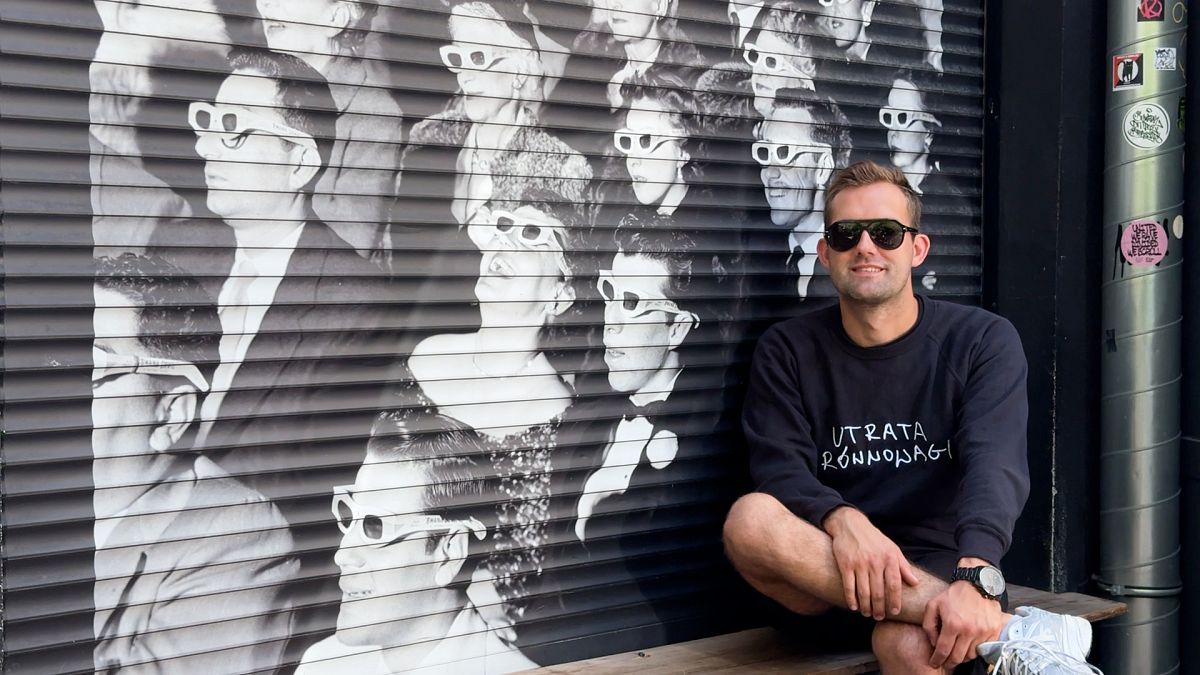Small but perfectly formed, kino Amondo is the tiniest movie theatre in the Polish capital.
The venue is bustling with life being a cinema to watch films and, with shoots also taking place, it’s truly a celebration of the art form in more ways than one.
Its co-owner is Korek Bojanowski, an up-and-coming film director, is an extremely busy man. He’s just returned from trips to Shanghai and Brussels, and meets us before heading off to yet another film festival in Poland, where his debut work, A Loss of Balance, will be screened.
We step over cables and brush past a film crew, which happens to be recording on site, and quietly wait to meet our subject. Soon after however, we discover we didn’t need to be so discreet…
A camera entwined with emotions
Korek Bojanowski describes himself as an extremely raucous spectator. “I’m the kind of viewer who gets most scared at horror films, laughs most at comedies, sobs most at melodramas. And this is the way I express my love for the art form. The fact that it exists, that it builds up some kind of suspension of disbelief.”
Among his inspirations are the early works of Roman Polanski. Elements in the Polish director’s work, such as the close proximity the audience feels towards the protagonist, coupled with close-up shots showing the minutiae of their emotions, as if drilling into them, harken back to these traditions previous popularized in Polish cinema.
As he puts it, “playing” with dialogues is also important to him.
What does art demand of the artist?
Bojanowski’s latest work tells a coming-of-age story, based on the director’s own experiences.
It follows “a group of students who are preparing for their graduation performance. A new director stands in their way and a game begins between them,” he says.
“I wanted to understand her to the maximum”, he says, describing his main character.
“Her situation is inspired by the revelation of pathological situations occurring in Polish film schools in 2020. The film shows the methods of breaking acting students and forcing them to push their limits, because it was considered that the art simply demanded it.”
“This was the norm in Polish film schools for 60-70 years. And everyone knew about it. It caused massive levels of trauma,” the director explains.
He’s referring to a Polish film school graduate’s social media post which raised alarm and sparked a movement. Not long after, the internet was flooded with descriptions of similar experiences by Polish artists. “These were already very experienced actors and actresses. Suddenly it turned out that even people who are fulfilled in this profession have experienced something like this and continue to carry some kind of such wound inside them.”
“Suddenly it turned out that professors, due to the fact that they have power, abuse this power and often just take it out on students in a physical and psychological way,” explains Bojanowski, outlining how he began to explore the topic. “I wanted to tell a story about entering adulthood. About how much of ourselves we have to sacrifice to reach [creative] fulfillment”.
Recognition in Brussels (and beyond)
In 2024, Bojanowski’s debut was first recognised at the Gdynia film festival. Most recently, it was screened during the closing of the Polish Presidency of the Council of the EU in Brussels.
“We were in Brussels, at one of the local cinemas,” says Bojanowski. “It was a show that brought together people connected to the European Parliament, to cultural institutions that are connected to the European Union.”
The world premiere of A Loss of Balance had just taken place in Shanghai, where it was recognised and won an award for its screenplay.
“We spoke to the jury, headed by Giuseppe Tornatore, and they liked this film. It turned out that the themes that we address in this film are universal and reach people all over the world somewhere,” says Bojanowski.
The smallest cinema in Warsaw
The auditorium in which we’re meeting seats 25 people, the other has a capacity for 20. Kino Amondo, which is the smallest cinema in Warsaw, is a place devised by a collective of filmmakers, where they create, showcase, promote, and discuss their works. “We try to do a lot of different things related to film. Each of us produces, directs, writes,” says Bojanowski.
Bojanowski finished film school in Paris, but returned to Poland at the age of 21. With his industry connections scattered around the world, he began anew in his home country, building up a new layer of self-reliance.
When working on A Loss of Balance , he knew from the start that he would have to handle the ins and outs of scriptwriting, production, and directing on his own.
“The moment I gathered those tools, I knew I was ready to make a film and that I was in control,” – he explains.
Finding the right balance
But what does the future hold for this promising young face in the industry?
“I’m putting together my next film and I hope to get into shooting this year,” Bojanowski says about his plans.
“It’s also a film about entering adulthood, but at another stage. Because I feel that A Loss of Balance is about the let-downs we face in the world, how we thought the world was ours and we figure out that in reality, it isn’t.”
“The second stage of this process of entering adulthood, when we don’t let the world down, we let ourselves down,” is what the film seeks to focus on, according to Bojanowski.
Being from Warsaw himself, he adds that the story – a dark comedy – will be set in the Polish capital, which continues to inspire him.

